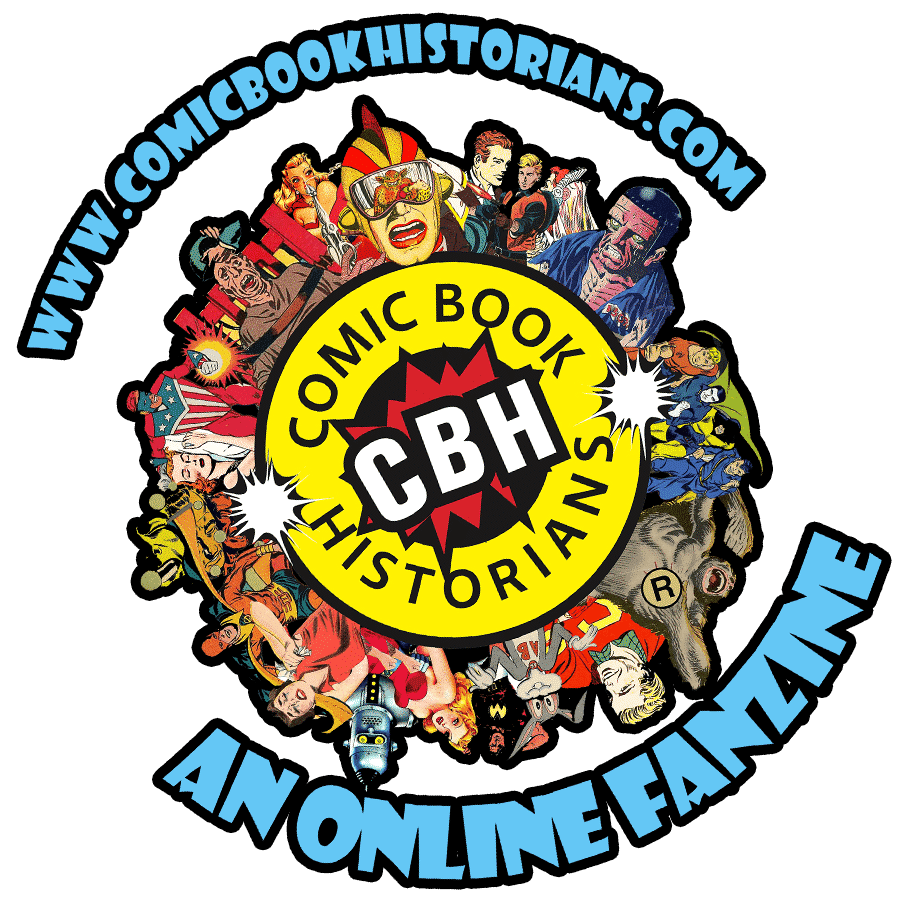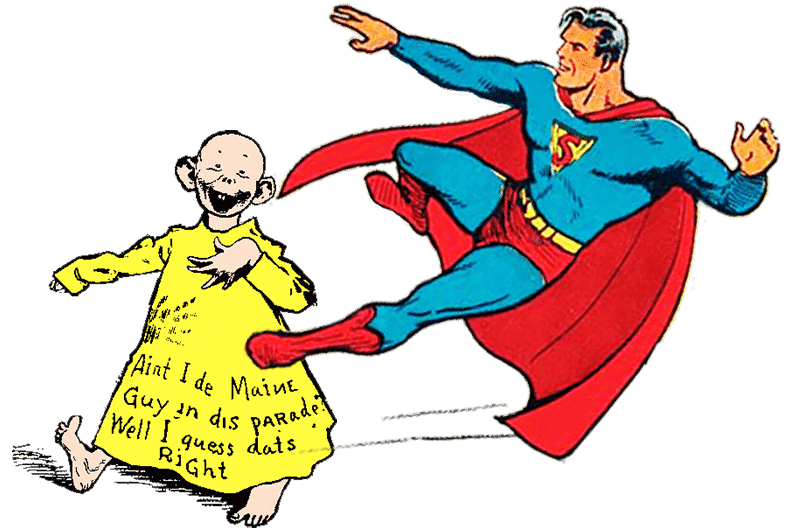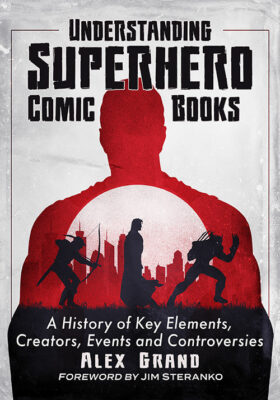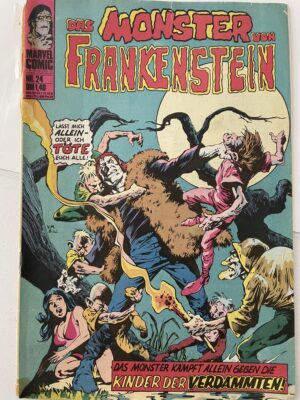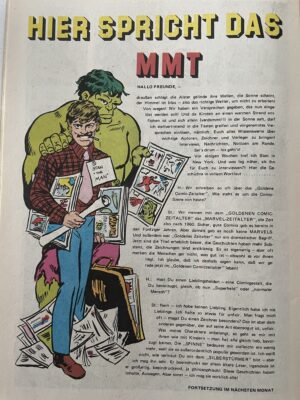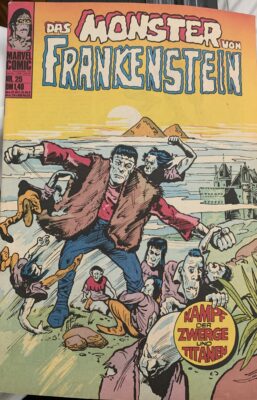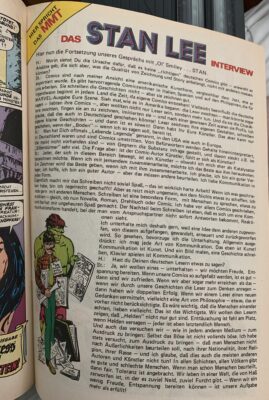1976 Stan Lee West Germany Interview Discovered!
Read Alex Grand’s Understanding Superhero Comic Books published by McFarland Books in 2023 with Foreword by Jim Steranko with editorial reviews by comic book professionals, Jim Shooter, Tom Palmer, Tom DeFalco, Danny Fingeroth, Alex Segura, Carl Potts, Guy Dorian Sr. and more.
In the meantime enjoy the show:
My friend and colleague from Globo Comico, N. Scott Robinson Ph.D. was kind enough to share the second half of this Stan Lee interview from the West German Monster of Frankenstein book from 1976. The interview is in the German language, and I had it translated through a service. Professor Robinson guided me to the ebay listing for the first half, and I purchased that and had that translated as well. Here it is finally combined into one English translated interview with Stan Lee.,
Cheers
Alex Grand
HELLO FRIENDS, –
Outside, the Alster is lapping gently, the sun is shining, the sky is blue – just the right weather for not working!
No way! We have made a promise, which is now to be kept! And since Kirsten has escaped to a warm beach and is alone (damn it!!) basking in the sun, I’m allowed to take up the cudgels and fulfill the aforementioned promise, namely: to bring you everything you need to know about important authors, cartoonists and publishers!
Interviews, news, notes on the side.
Anyway – here we go! A few weeks ago I met Stan in New York. And what could be more natural than to interview him for you!!! Here is the story in full wording ………
H.: We write so often about the “Golden Age of Comics”. What is the state of the comic book scene today?
Stan: By the “GOLDEN COMIC AGE” we mean the “MARVEL AGE,” the time after 1960. Sure, there were already good comics in the fifties. But at that time there were no MARVELS. And besides, “Golden Age” was just a dramatic term. Now the titles are considerably better, the stories have more substance, the drawings are first class. It’s strange – but often people don’t realize what’s good – even though it’s in front of them. I think that’s why I can say that we’re living in the “Golden Age of Comics” right now.
H: Do you have a favorite hero – a comic character that you prefer, whether it’s a “superhero” or an “ordinary normal person”?
Stan: No – I don’t have a favorite. Actually, I never have favorites. I think that’s unfair. People often ask me – do you like one artist in particular? But that’s unfair to the other one, who is just as good in his own way. As far as my characters are concerned, I feel the same way. Like with children – you love them all the same, but you don’t prefer any of them. Spider-Man perhaps means a little more to me because it has become so extraordinarily popular. I don’t know how familiar you are with the Silver Surfer- but I like it very much. It impresses especially older readers, somehow it’s great, impressive, even philosophical. These stories have content, statements. But otherwise – I really like them all!
H: What do you think is the reason for the fact that there are no “real” German comics – although there have been attempts, but they can’t compete with others in terms of quality of drawing and story?
Stan: In my opinion, comics are an American art form, comparable to jazz before it was exported. There are excellent comic artists in Italy, Spain and the Philippines who work for us. They don’t write the stories, but they draw well. At some point, in every country, the time begins when their own comics are created! Maybe the German MARVEL issue is influencing your scene. Look how it started in America: readers liked-one could even say-loved their comics-but didn’t want to be just readers, they wanted to do more. And since they liked the characters, they started drawing, imitating them- and after a while they were professionals. I believe that this could happen in Germany, too! Readers draw their own characters, write their own little stories – and then it’s done! Then you have your artists. But that can only happen if the “ground” – if I should say so – is ready.
H: You have often been called a Living Legend, in the USA as well as in Europe. In Germany, comics were and are controversial. Proponents interpret content into them that is usually not there – opponents question the substance, and there is a lot of that in “Silver Surfer,” for example. But the question is: is the comic author an artist, does he feel like an artist?
Stan: Everyone who works in this field is an artist – although I would rather describe myself as a catalyst. When I work with someone, I want to get the best out of them. A draftsman, will give the best when I collaborate with him. I think I’m a good publisher, I hope I’m a good writer – but that’s for others to judge. I love communication in any form. Actually, I don’t enjoy writing that much,-it’s really hard work! When I’ve written something, I’m downright exhausted! But it excites me immensely to create something out of nothing. I like to talk to other people. Writing is a special way of talking to people, of telling something – whether it’s a novella, a novel, a screenplay or a comic. I’ve mainly written comics, and I’ve enjoyed that immensely. The disadvantage of writing is that it’s a form of communication in which you don’t get immediate answers from the other person, you don’t see reactions. I like to converse because an idea is thrown at the other person, caught by him, transformed, renewed and thrown back. From that point of view, I prefer conversation. Generally speaking, I like any kind of communication. That’s what art is! Communication is art. And painting a picture, writing a story, playing the piano is communication.
H: Do you have something to say to your German readers?
Stan: I want one thing – to entertain – we want to give pleasure, relaxation. If our comics are perceived in this way, it is good – then we are satisfied. But if we achieve even more than that – if through our story we make readers think – then we have double success. If we give a reader a new thought , maybe a kind of philosophy – something he did not consider before. It would be important that people laughed at each other, love each other maybe. That is the most important thing. We want to show readers that “heroes” are not only good. Disappointment is out of place when our heroes fail – everyone is human in the end. And we also try to express that – as in any medium: Even evil is not fully evil. I have always tried to express – that people should not be judged by appearance, by their nationality, their religion, their race – and I believe that most other writers and artists do not do this either! In all classes, in all peoples there are good and bad people. If you are going to judge people, judge them fairly. Tolerance is appropriate. We live in a world torn apart by hatred, where there is too much envy, too much fear. If we can give a little joy, relaxation – our task is more than fulfilled!!!
Images and Photos above ©Their Respective Copyright holders
Join us for more discussion at our Facebook group
Check out our CBH documentary videos on our CBH Youtube Channel
Get some historic comic book shirts, pillows, etc at CBH Merchandise
Check out our CBH Podcast available on Apple Podcasts, Google PlayerFM and Stitcher.
Use of images are not intended to infringe on copyright, but merely used for academic purpose.
